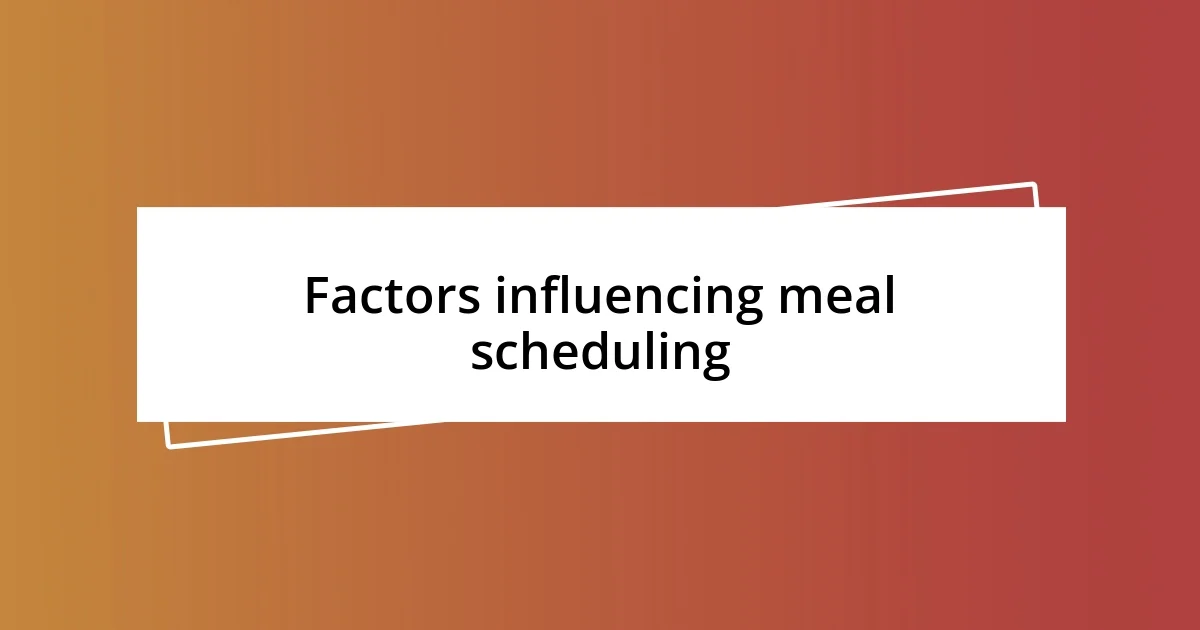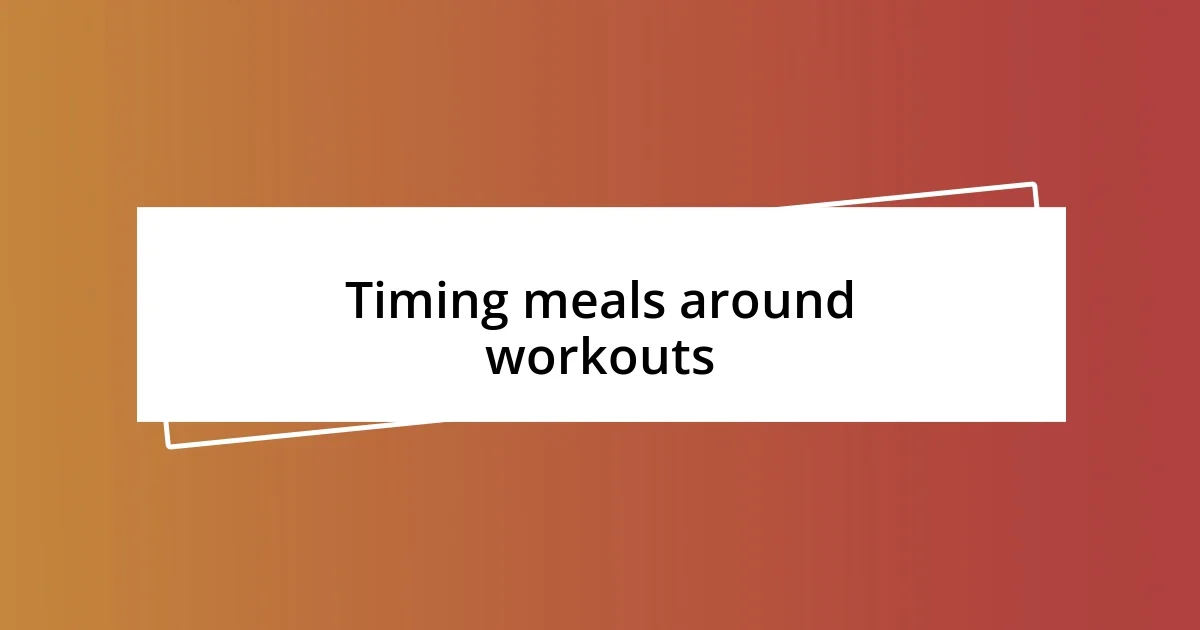Key takeaways:
- Consistent meal timing stabilizes blood sugar levels, boosts metabolism, and enhances overall energy, reducing cravings and late-night snacking.
- Key factors influencing meal timing include daily routines, hunger signals, and exercise schedules, which can maximize performance and overall well-being.
- Meal frequency should be personalized; smaller, frequent meals may prevent sluggishness and overwhelm, while recovery meals after workouts are essential for muscle repair and hunger management.

Understanding meal timing benefits
Meal timing can truly transform how our bodies function. I’ve noticed that when I eat my meals at consistent times, I feel more energized and my cravings decrease. Have you ever felt that midday slump? I used to hit a lull every afternoon until I adjusted my meals to include protein and healthy fats around that time. It made a world of difference!
Eating at regular intervals not only stabilizes blood sugar levels but also boosts metabolism. I remember struggling with late-night snacking, often munching on unhealthy options out of pure hunger. Once I started having a balanced dinner earlier in the evening—around 6 PM instead of 8 PM—I found myself sleeping better and waking up less hungry. Isn’t it incredible how a simple shift can lead to such a positive ripple effect?
Additionally, there’s something to be said about the psychological benefits of meal timing. I often share with friends how planning my meals has made me feel more in control of my health. It’s like setting a schedule that prioritizes my well-being. Have you tried it? You might be surprised at how satisfying it is to know when your meals are coming and to eat mindfully. It turns eating into a ritual rather than just another task on your to-do list.

Factors influencing meal scheduling
When I think about meal scheduling, a few key factors immediately come to mind. Firstly, our daily routines significantly impact when and what we eat. My schedule tends to be jam-packed, and I’ve learned that if I don’t plan my meals around work commitments, I’m left hungry and reaching for whatever is closest. This often leads to poor food choices—nobody wants to chow down on vending machine snacks just because they didn’t set aside time for a proper lunch!
Here are a few critical influences on meal timing:
- Work Hours: Shift patterns or long days can shift my meal times considerably.
- Social Commitments: Dinner invites or lunch meetings affect my eating schedule, pushing me to adjust my planned meals.
- Hunger Signals: Listening to my body is crucial. I often realize that my hunger peaks at certain times; aligning my meals with these signals helps me avoid overeating later.
- Sleep Patterns: A late breakfast after a late night may push my meals back, affecting my energy levels throughout the day.
Notably, I’ve found that adjusting my meal times based on exercise routines creates a noticeable difference in my performance and recovery. For instance, scheduling a nutrient-dense snack about 30 minutes before my workout gives me just the right boost. The satisfaction I feel from being intentional about my meal timing can’t be overstated—it transforms eating into a mindful practice that fuels not just my body but also my overall well-being.

Optimal meal frequency for health
When it comes to optimal meal frequency for health, I’ve learned that there isn’t a one-size-fits-all approach. Personally, I find that eating smaller, more frequent meals works best for me. It keeps my energy levels stable and prevents the sluggishness that often accompanies larger meals. On days I opt for three larger meals, I notice my afternoon productivity dropping. It’s fascinating how a shift in meal size can influence my focus and energy.
Moreover, there’s something rewarding about listening to my body’s natural rhythms. I usually aim for five small meals spread throughout the day, and during that time, I’ve developed a keen sense of when I’m genuinely hungry or when it’s just habit. I often relate this to a friend who follows intermittent fasting. While that method brings her benefits and helps her with weight management, I’ve realized that my own approach allows me to avoid the overwhelming hunger that sometimes leads to poor choices. Does anyone else relate to that feeling of needing a snack right before dinner because lunch was too far apart?
As I’ve changed my meal frequency, I’ve also noticed an improvement in my overall mood. Those moments of “hitting the wall” at work? Much less frequent now. I often prepare my snacks ahead of time—think nuts, yogurt, or veggie sticks—which not only keeps my nutrition in check but also adds a playful variety to my daily meals. Being proactive rather than reactive with my meals makes such a difference!
| Meal Frequency | Benefits |
|---|---|
| 3 Meals a Day | Can work well for those with set schedules; promotes larger, more satisfying meals. |
| 5-6 Small Meals a Day | Helps maintain steady energy levels; reduces hunger and prevents overeating. |
| Intermittent Fasting | Can aid in weight loss; may improve metabolic health for some individuals. |

Timing meals around workouts
It’s amazing how timing meals around workouts can really enhance performance. I’ve personally experienced that having a protein-rich snack just an hour before hitting the gym energizes me like nothing else. I remember one day when I skipped this ritual and struggled through my workout, regretting that decision halfway through. Isn’t it funny how something as simple as a well-timed bite can significantly affect our energy levels?
After workouts, I cannot overstate the importance of a recovery meal. I make it a point to refuel with a mix of carbs and protein within an hour after I finish exercising. This practice not only helps repair my muscles but also keeps my hunger at bay, preventing me from reaching for less nutritious options later. I often find myself craving something hearty and fulfilling after a workout. So, having a planned post-exercise meal has become more than just routine for me; it’s a source of satisfaction and nourishment.
I once had a friend who would work out on an empty stomach—her idea was that it would help with fat burning. While this might work for some, her constant fatigue made me wonder. Isn’t it more beneficial to give our bodies what they need to thrive? Personally, balancing my meals around my exercise routine has led to improved workouts and better overall moods. Whenever I make this effort, I feel like I’m truly taking care of myself, and that feeling is invaluable!














